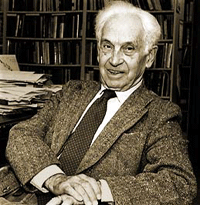ERNST MAYR: A REMEMBRANCE - 1904-2005
Ernst Mayr is dead at a hundred years of age, as lordly a cedar as ever stood in evolutionary biology and life more generally. He was full of vigor right up to the end. A stronger phenotype I never saw, personal quality matched to intellectual power. Everyone needs a moral compass in life and for a time in my life Ernst was exactly that, integrity, honesty, and a life based on sound moral principles — a standard to which one could turn for self-criticism and inspiration. His intellectual powers were legendary. He had a photographic memory, which only gave way in his 50s. He kept it hidden in his youth, in part because it gave him a rather unfair advantage in the German educational system built on rote learning. Later it gave him an additional power to those of analysis and synthesis that permitted such great books as Animal Species and Evolution (1963) and (with Jared Diamond, 2001) The Birds of Northern Melanesia. The distinctions he emphasized were fundamental, meaning vs mechanism, for example. Mechanism is what most biologists study, how does the machine work. But what about meaning? Why has the machine evolved to work the way it does? What is the meaning of the mechanism? Put that way, it is obvious that evolutionary biology deals with the profounder of the two halves.
He protected and promoted evolutionary thought from every angle. He was a rock and a bulwark against the arrogant and the ignorant. Four groups come to mind. First, the molecular biologists of his time, who, if they had had their way, would have swept all of evolutionary biology into a trash heap to be carted away—but who now can not make sense of their own field without evolutionary logic. Second, the physicists, who taught that the history and methodology of physics was the history and methodology of science itself—and that a "theory of everything" can be formulated purely in the language of physics.
Third, Ernst stood strong against the medical profession. Long before "Darwinian Medicine" he preached against the absurdity of memorizing the names of the 206 human bones while not taking a single course in evolutionary biology, a course that might help physicians understand the human organism in terms of what it is designed to do (as well as understand the parasites that afflict us). Feed thalidomide and other heavy chemicals to women pregnant with child in order to alleviate morning sickness? Depends, in part, on whether you think the sickness evolved to serve a useful function (protect the fetus from naturally occurring poisons) or was a mere side-effect of the pregnant state. And, finally, he was a rock and a bulwark against those who would arrogantly assert—without study or deep thought—how their God must have created the living universe. In short, Ernst was a mighty cedar "under" which, in the words of the great prophet Ezekiel (17,23), "dwell all fowl of every wing; in the shadow of the branches thereof shall they dwell".
Ernst was also a very loving man. He was, for example, a loving host. When my beautiful wife Lorna was seven months pregnant with our first child, we drove to New Hampshire to spend a day with the Mayrs on their farm. He took us for a nature walk, nearly half a mile long with a remarkably clean path among the pine needles. When I commented on this I learned that Ernst himself had gotten up at six that morning to sweep that long path clean, lest Lorna slip, fall and injure herself.
He was also a loving husband. I once visited Ernst and his wife Gretel in their home in Cambridge. Ernst mentioned a paper in German that he had recently translated, when Gretel cut him off and said, "But, Ernst, it was I who translated that paper". Then, she turned to me and said, "You know, Bob, Ernst and I are like one, but still it was I who translated the paper". Ernst looked sheepish and never referred to that paper again without adding "which my wife so kindly translated for me".
And, finally, he was a loving teacher. I remember the time he was urging intellectuals to reproduce—not go wild, you understand, but at least replace themselves in the human population. To be sure, he said, we were partly a "homozygous fringe" but we should still make the effort. I loved that moment. How tiresome it is to hear people forever promoting themselves and producing ever feebler arguments on how that benefits everyone. Here was someone who could describe himself (and his kind) as being a "homozygous fringe", an effervescent congruence of doubled-up genes with their own defects, unlikely to be preserved as such in the future. Here was someone you could count on to look reality square in the face, still urge the students to do what was good for them, but without (may God rest his soul and bless the family he leaves behind) all the self-deception.
Robert Trivers
Cambridge, MA
February 8, 2005
(ROBERT TRIVERS is an evolutionary biologist at Rutgers University and the author of Natural Selection and Social Theory.)


